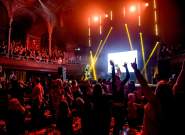Cemeteries, ‘Churches of Technology’, Literary Martyrs, outcasts, myths and a panel of esteemed writers in conversation, are all items that will feature in the upcoming Death and the Sacred Conference taking place at Manchester Metropolitan University. The date is March 22nd 2019 and the conference will take place in the Brooks Building of The University, co-ordinated by Dr Eleanor Beal (Manchester Metropolitan University) with a keynote speech from Simon Marsden, Senior Lecturer in English Literature at the University of Liverpool. Those interested in attending can register online here. (Prices: Full Rate for paid staff/non-students - £55, Subsidised PG student/Staff rate - £30)
.png)
The whole-day conference is set to explore depictions of Death and the Sacred across a number of cultural fields, including literature, art, history, human geography and religious studies. From thinking about the emotions we associate with cemeteries, to contemplating the changing nature of what is seen as a ‘Sacred space’– these are just some examples of the many areas for thought.
A stand-out aspect after all, is the interdisciplinary nature of the day; highlighting an event which is a unique collaboration between a number of subjects, both within Manchester Metropolitan University and across other universities.
Registration begins at 8am, allowing for a 9am beginning which will include a welcome introduction and opening remarks from conference co-ordinator Dr Eleanor Beal (Manchester Metropolitan University). Eleanor is currently an associate lecturer researching feminism, religion, theology and the Gothic.
Also highly anticipated is a keynote speech from Simon Marsden, Senior Lecturer in English Literature at the University of Liverpool. As the author of Emily Brontë and the Religious Imagination (2014) and The Theological Turn in Contemporary Gothic Fiction: Holy Ghosts (2018), Simon’s work often explores the relationship between Romantic era of English Literature, religion and the present day.
The day’s events will feature a range of academics discussing their work – with themes considered in the morning including ‘Cemeteries’, especially in terms of artistic and sacred encounters with them. The concept of a ‘Merry Cemetery’ may sound initially unusual – but it is after all the subject of a paper which is due to be delivered by Rodica Arpasanu (Manchester Metropolitan University), considering the site of the named ‘Merry Cemetery’ in Sapanta, Romania, where tombs are marked with carved portraits, vibrantly coloured wooden crosses and even humorous epitaphs. Arpasanu’s work often considers the reception of death in society, with her research as a PhD student in Human Geography involving especial focus in contexts of ‘death tourism’.
Artwork is also another approach to these spaces of burial and remembrance, which Siobhan Maguire-Broad (University of Huddersfield) is due to highlight as she delivers ‘An overview of St George’s Fields History’. This will take the form of an illustrated talk complete with images of art she has made inspired by St George’s Fields (a former cemetery within the grounds of The University of Leeds) over the last five years. (pictured below)
The morning of the conference will also consider papers under the intriguing theme of ‘Churches of Technology’ – exploring the changing nature of sacred space amidst modernisation, technological expansion and even increased nuclear threat. The discussion of this fascinating field will include Becky Alexis- Martin (Lecturer in Political and Cultural Geographies at Manchester Metropolitan University) talking on the subject of ‘Deus Ex Atomica: Death, memorialisation and nuclear warfare’.
Lunch will follow the morning’s discussion, with an hour period (12-1pm) set aside to enjoy refreshments as well as a unique lunchtime screening of the short film ‘Frankenstein Re-membered’(2018), created by Chris Gerrard; a video artist and film historian currently undertaking a PhD in the ‘Cinematic Multi-Image’ at the University of Dundee. Originally made for the Being Human Festival’s celebration of the 200th anniversary of the original text, this film provides a unique adaption of the original Shelley novel through cinematic technique.
Talks then re-convene in the afternoon, with a highly anticipated element being a ‘Writers in Conversation’ session at 1-2.30pm, featuring four highly acclaimed writers discussing how their creative works consider and/or encounter the themes raised in the conference, as well as death and the sacred more widely.
.png)
The featured writers for the conference include Andrew Michael Hurley (pictured above: credit to Hal Shinnie), author of award-winning The Loney (which has been interestingly praised as a ‘modern gothic’ novel) and also Devil’s Day. He often reflects on how the dark themes and encounters with mortality in his books is significantly inspired by Northern landscapes, as seen in his previous interview with HAUNT:
“The landscape of Morecambe Bay in The Loney was familiar to me from childhood and I grew up thinking of it as a place of quicksands and dangerous tides. And it was that sense of menace that really drew me back there when I was thinking of writing the novel…”
Also featured in the Writers in Conversation session is the new writer-in-residence of John Ryland’s Library Rosie Garland who authored Nineteenth Century Manchester-inspired The Night Brother and also Vixen (amongst others) – the latter which she will be discussing in detail and reading from during the event. Also discussing and reading her own work will be writer Jenn Ashworth with her novel Fell, and also Catherine Willcox, with the in-conversation chaired by Eleanor Beal herself.
After all, the conference indicates not just the importance of discussing death and the sacred, but its effect upon popular culture and society. Following a short break until 3pm, the second half of the afternoon will commence with the discussion of ‘Literary Martyrs’ – chaired by Manchester Metropolitan University’s Jonathon Greenaway. This will include Mark Robinson (University of Sunderland) talking about the 19th Century Gothic Novel, with a focus on Mary Shelley’s Frankenstein, Charlotte Bronte’s Jane Eyre and Oscar Wilde’s The Picture of Dorian Gray in particular. Stephen Curtis (Lancaster) will then elaborate on ‘The Martyr in Early Modern Lit/Culture as a form of Horror’; the subject of his research.
‘Death and the Sacred’ is indeed a conference that uncovers fascinating stories of the past, as well as contributing to forward-thinking research. The story of playwright John Constable and his vision of the ghost of a medieval prostitute named ‘Goose’ who told him of the ‘forgotten crossbones graveyard’ is the subject of a paper by Lucy Talbot (Winchester University), which features under the final theme of the day: ‘Myth and the Outcast Dead in Art and Literature’. Jonathon Greenaway will also present a paper on this subject.
Following the talks, the closing keynote speech will be delivered by Dr Simon Marsden. The addition of a wine reception and opportunity for book signing further highlights the special quality of the day, with an optional conference dinner to follow. For those with an interest in cultural studies and the impact of death, religion and the sacred, this is a highly recommended event.







